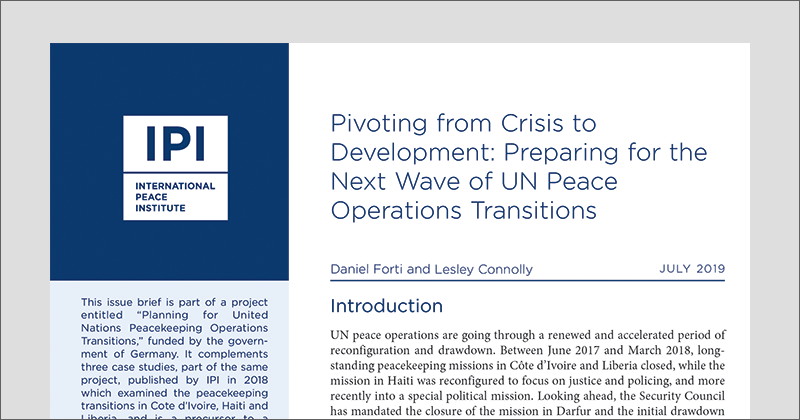
UN peace operations are going through an accelerated period of reconfiguration and drawdown. Between June 2017 and March 2018, long-standing peacekeeping missions in Côte d’Ivoire and Liberia closed, while the mission in Haiti was reconfigured into a transitional peacekeeping mission. Looking ahead, the Security Council has mandated the closure of the peacekeeping mission in Darfur and the initial drawdown of the peacebuilding mission in Guinea-Bissau, and its attention is starting to shift to other missions.
With these upcoming transitions in mind, this issue brief explores experiences and lessons from recent UN transitions in Côte d’Ivoire, Haiti, and Liberia. Each of these transitions has been the subject of a detailed IPI policy report published as part of IPI’s project on “Planning for United Nations Peacekeeping Operations Transitions.” Drawing on this research, this issue brief recommends how to manage politics and recalibrate policies to better shape future transitions. Its recommendations include to:
- Adopt shared and long-term political strategies, particularly in Security Council mandates and benchmarks, as well as through regular sharing of assessments from the field.
- Ensure integration in field-level planning strategies well before the Security Council sets transition timelines, with senior leadership from the mission shaping the vision, driving planning, and providing concrete recommendations for the future UN presence in the country.
- Strategically engage the host society to align peacebuilding priorities and to communicate the core message that the mission is leaving but the UN is remaining in the country.
- Engage early to secure adequate financing, capitalizing on debates surrounding the transition while it is still on the Security Council’s agenda.
- Institutionalize dedicated transition support capacity within the UN system, including policy and programmatic guidance, operational support, planning expertise, and surge capacities.
- Sustain long-term peacebuilding through partnerships, ensuring that residual peacebuilding challenges are mainstreamed into national development plans and international and regional development frameworks.







